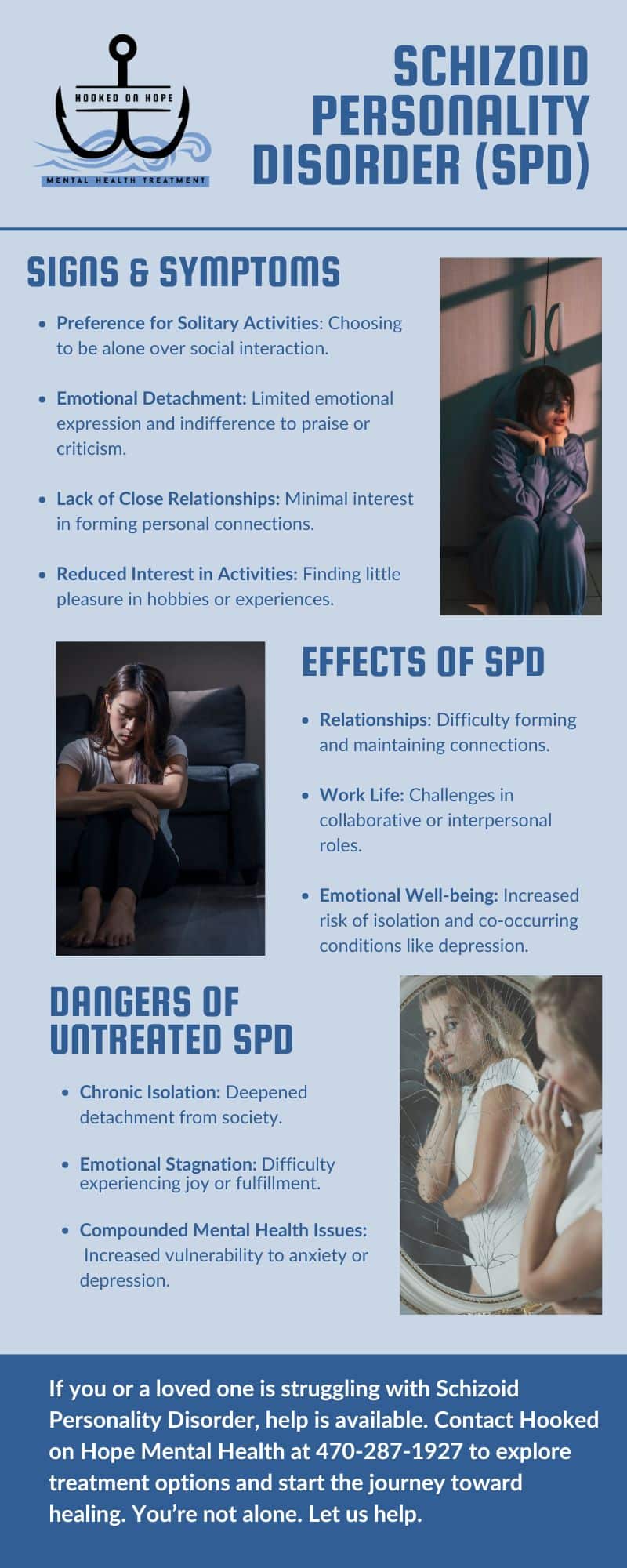Schizoid Personality Disorder (SPD) is a complex mental health condition that often goes unnoticed due to its subtle presentation. Individuals with SPD tend to be detached from social relationships and exhibit a limited range of emotions in interpersonal settings. This blog aims to provide a comprehensive understanding of SPD, including its symptoms, causes, risk factors, diagnosis, and treatment options, to support those affected and their loved ones.
What is Schizoid Personality Disorder?
Schizoid Personality Disorder is a type of personality disorder characterized by a pervasive pattern of detachment from social relationships and a restricted emotional expression. People with SPD often appear aloof, indifferent, and emotionally cold. They prefer solitary activities and have little interest in forming close relationships, including with family members.
SPD is classified under Cluster A personality disorders in the Diagnostic and Statistical Manual of Mental Disorders (DSM-5), which are characterized by odd or eccentric behaviors. It’s important to note that SPD is distinct from schizophrenia, although they share some similar features. Individuals with SPD do not typically experience hallucinations or delusions associated with schizophrenia.
Symptoms of Schizoid Personality Disorder
Recognizing the symptoms of SPD can be challenging, as individuals may not seek help due to their preference for solitude.
Key Schizoid Personality Disorder symptoms include:
- Preference for Solitary Activities: Choosing to engage in activities alone rather than with others.
- Lack of Close Relationships: Minimal desire to form intimate relationships or friendships.
- Emotional Detachment: Appearing indifferent to praise or criticism and showing limited emotional expression.
- Little Interest in Sexual Experiences: Reduced or absent interest in sexual relationships.
- Indifference to Social Norms: Lack of concern for social conventions or expectations.
- Difficulty Responding to Social Cues: Challenges in understanding and reacting appropriately to social signals.
- Limited Pleasure in Activities: Finding little enjoyment in most activities, including hobbies.
These symptoms typically begin in early adulthood and persist over time, affecting various aspects of life, including work and social functioning.
Causes of Schizoid Personality Disorder
The exact cause of SPD is not fully understood, but it is believed to result from a combination of genetic, biological, and environmental factors:
- Genetics: A family history of personality disorders or mental illnesses may increase the risk of developing SPD.
- Biological Factors: Abnormalities in brain chemistry and function might contribute to the development of the disorder.
- Environmental Influences: Childhood experiences, such as emotional neglect or abuse, can play a role in shaping personality traits associated with SPD.
Early interactions with caregivers who are unresponsive or emotionally detached may lead to attachment issues, influencing the development of SPD.
Risk Factors for Schizoid Personality Disorder
Several factors may increase the likelihood of developing SPD:
- Family History: Having a relative with SPD, schizophrenia, or another personality disorder.
- Childhood Neglect or Abuse: Experiencing emotional neglect, abuse, or a lack of nurturing during childhood.
- Cultural and Social Isolation: Growing up in an environment with limited social interactions.
Understanding these risk factors can aid in early identification and intervention, potentially improving outcomes for those affected.
Diagnosing Schizoid Personality Disorder
Diagnosis of SPD involves a thorough psychological evaluation by a mental health professional.
The assessment may include:
- Clinical Interview: Discussing symptoms, personal history, and behavioral patterns.
- Medical Examination: Ruling out other medical conditions that might cause similar symptoms.
- Diagnostic Criteria: Evaluating symptoms against the DSM-5 criteria for SPD.
According to the DSM-5, a diagnosis requires a persistent pattern of detachment from social relationships and restricted emotional expression, as indicated by at least four of the following:
- Neither desires nor enjoys close relationships.
- Almost always chooses solitary activities.
- Has little interest in sexual experiences with another person.
- Takes pleasure in few activities.
- Lacks close friends or confidants other than immediate family.
- Appears indifferent to praise or criticism.
- Shows emotional coldness, detachment, or flattened affectivity.
It’s essential to differentiate SPD from other conditions, such as autism spectrum disorder, depression, or schizophrenia, to ensure appropriate treatment.

Can Schizoid Personality Disorder Be Cured?
Currently, there is no cure for SPD, but symptoms can be managed effectively through appropriate treatment. Early intervention can lead to significant improvements in functioning and quality of life. Treatment focuses on helping individuals develop coping strategies, improve social interactions, and address any co-occurring mental health issues.
It’s important to recognize that individuals with SPD may not seek help on their own due to their preference for solitude and lack of perceived distress. Encouragement and support from loved ones can be crucial in motivating them to engage in treatment.
Treatment for Schizoid Personality Disorder
Treatment for SPD often involves psychotherapy and, in some cases, medication to address co-occurring conditions.
Key approaches for Schizoid Personality Disorder treatment include:
Psychotherapy
- Cognitive Behavioral Therapy (CBT): Helps individuals recognize and change negative thought patterns and behaviors.
- Psychodynamic Therapy: Explores unconscious feelings and past experiences that influence current behavior.
- Group Therapy: Provides opportunities to practice social skills in a safe environment, though some individuals with SPD may find group settings challenging.
Therapy aims to improve social interactions, enhance emotional expression, and develop coping mechanisms to manage symptoms.
Medication
While there are no specific medications for SPD, pharmacotherapy may be used to treat associated symptoms or co-occurring conditions such as depression or anxiety. Antidepressants or anti-anxiety medications can help alleviate certain symptoms, enhancing the effectiveness of psychotherapy.
Supportive Interventions
- Social Skills Training: Teaches practical skills for interacting with others and understanding social cues.
- Psychoeducation: Provides information about SPD to the individual and their loved ones, fostering understanding and support.
Lifestyle Adjustments
- Routine Establishment: Creating structured daily routines can provide a sense of stability.
- Mindfulness and Relaxation Techniques: Practices such as meditation can help manage stress and improve emotional awareness.

Supporting a Loved One with Schizoid Personality Disorder
If someone you care about is struggling with SPD, your support can make a significant difference:
- Encourage Treatment: Gently suggest seeking professional help without being forceful.
- Respect Boundaries: Understand their need for personal space and solitude.
- Provide Emotional Support: Offer reassurance and understanding without pressuring them to change.
- Educate Yourself: Learning about SPD can help you empathize with their experiences.
Remember, patience and compassion are key in supporting someone with SPD.
Schizoid Personality Disorder Treatment in Atlanta, GA
Schizoid Personality Disorder is a complex condition that affects an individual’s ability to form relationships and express emotions. While it presents challenges, understanding the disorder and seeking appropriate treatment can lead to meaningful improvements in functioning and quality of life.
At Hooked on Hope Mental Health, we are dedicated to providing compassionate care and effective treatment options for individuals with SPD and other mental health conditions. Our team of experienced professionals is here to support you or your loved one on the journey toward healing and personal growth.
If you have concerns about SPD or any mental health issues, don’t hesitate to contact us at 470-287-1927 or fill out our online contact form today. Early intervention can make a significant difference.







